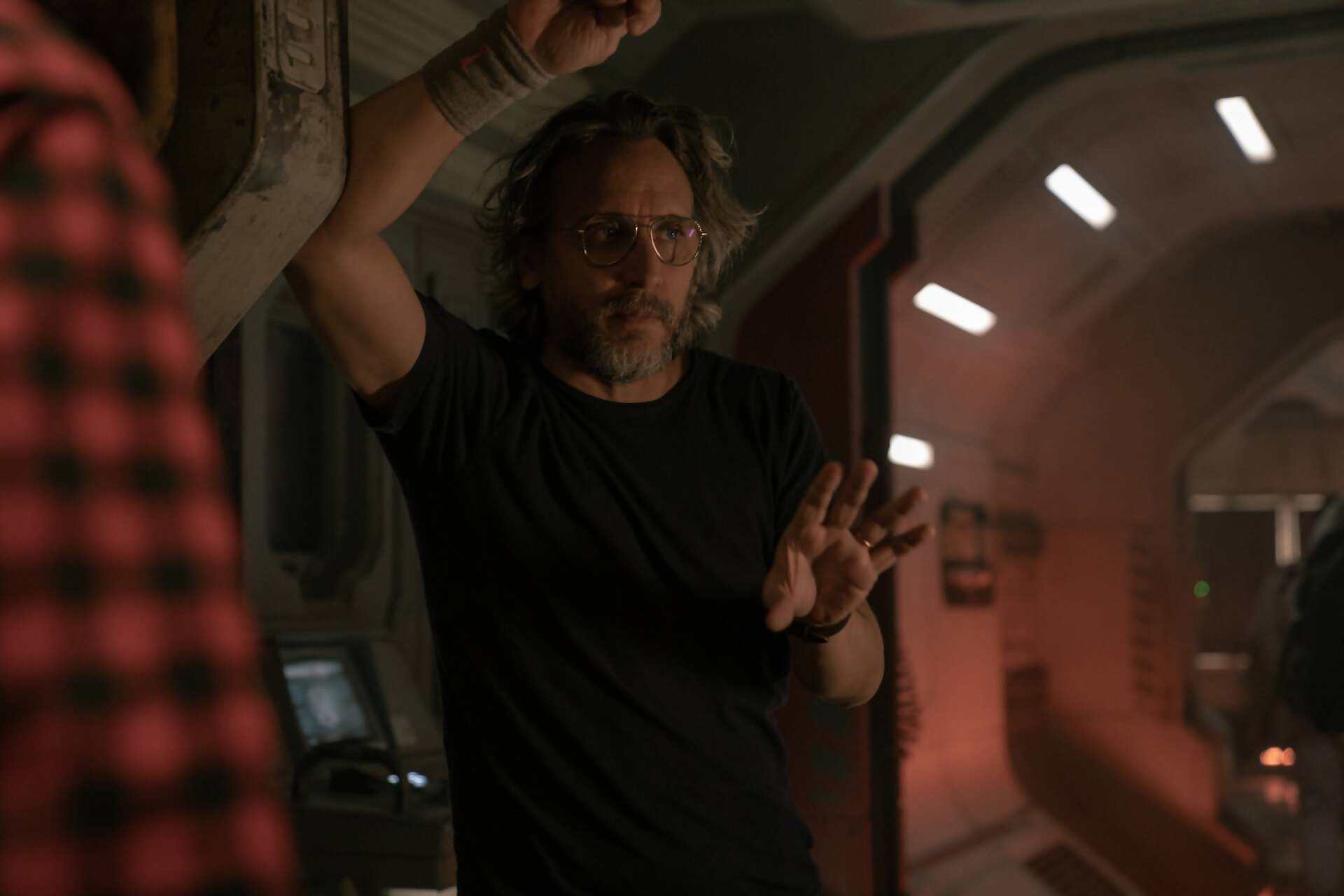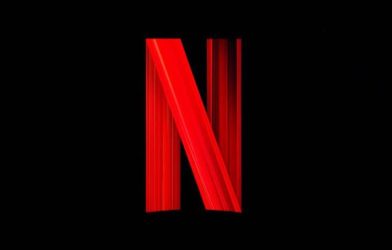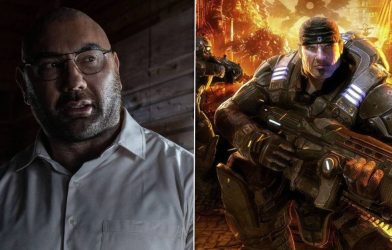Writer-director Fede Alvarez talks exclusively about his new film, Alien: Romulus and his handmade approach to its making.
Alien may be a 45 year-old franchise by now, bearing the fingerprints of such filmmakers as Ridley Scott, James Cameron and David Fincher, but Uruguayan director Fede Alvarez has taken a distinctly personal approach to making the upcoming Alien: Romulus.
Echoing his first two feature films, Evil Dead (2013) and Don’t Breathe (2016), Alien: Romulus places a small group of youngsters in a claustrophobic scenario and lets the horror play out. In this case, six scavengers – among them Cailee Spaeny’s Rain and David Jonsson’s Andy – sneak onto the Renaissance, an abandoned Weyland Yutani station orbiting their backwater planet. Needless to say, they find something toothsome and distinctly unfriendly hiding in the abandoned vessel.
As we met Fede Alvarez in June, we’d just seen a selection of scenes from the film that weighed in at roughly 20 minutes. They gave a flavour of the hand-built sets and practical effects that Alvarez has had built for the film, and it’s evident from our conversation that he’s genuinely passionate about recapturing some of the gritty, analogue essence from the franchise’s first two movies.
Lightly edited for length and clarity, here’s what Fede Alvarez had to say about making his own Alien movie on a tight budget, being unafraid to divide audiences, and how he’s countering apathy in Hollywood.
From the footage, it feels like it’s a haunted house movie in space, which of course is what Alien was; Ridley Scott was influenced by The Texas Chain Saw Massacre. Did you look back on the context of Alien and the films that were around it in the 1970s?
Yeah. I did it with Evil Dead and I did it again here. Quite a lot of my research in the beginning is trying to understand what those movies really meant when they came out, not what they are now. Now they’re bigger than life and all the critics will agree it’s a masterpiece. But at the time, Ridley says that half of the critics destroyed the movie. They thought it was complete shit – rubbish. It was just too violent and gratuitous. Then there was the other half that said, well, it’s effective at what it does and that’s it.
People were revolted by it and couldn’t stand it – thought it was too much. So the question is, how do you do that again? If you’re aiming for the critically acclaimed masterpiece, then you’re doing it wrong. You’re not understanding that those things were not [acclaimed] at the time. It’s the same thing here; I tried to do it in a way where I think maybe half won’t like it and the other half will love it. I always prefer it when it’s that way. Rather than one hundred percent saying, ‘Eh, it’s okay.’ [Laughs] I think that’s the worst. If there’s friction, you try a bit more.
That’s usually the beginning of it, trying to go back. And you’d be surprised sometimes how different the perception at the time was compared to what it is today. Ridley [Scott] always talks about that. Ridley has a framed review of Blade Runner in his office.

The Pauline Kael one. She absolutely monstered it, didn’t she.
It reminds him that you can never know what you’ve done at the time. Because time will tell. He said that films that are called masterpieces at the time are forgotten and vice versa. Movies that at the time were called shit are now called masterpieces. He doesn’t care anymore about intellectualising a film or thinking about what it is.
So I try to start there, thinking about how it was originally and how we do that now. How do we create those similar emotions in the audience?
One thing that struck me in the post-screening Q&A is how funny you are. Do you think there’s a hint of black comedy in your films?
There definitely is. Between horror and comedy, there’s a really thin line. If you look at me and my co-writer writing these movies [Rodo Sayagues], with Evil Dead and Don’t Breathe, it’s pretty dark stuff, but we were laughing all the time when we were coming up with the ideas. We’d go, ‘What about this…’ and then we’d laugh at the absurdity.
Someone once said the only difference between comedy and horror is the music. It’s not that radical, but if you put the wrong piece of music on a horror movie, it’d make it funny. I don’t know if you’ve seen the trailer for Mrs Doubtfire as a horror movie – have you seen that?
I haven’t.
It’s gold. You should look it up. You put the right music on it, and it’s terrifying – just the creepiest concept ever. You have this ex-husband who’s dressed as a little old lady, trying to get into the kids’ house. It’s so wrong. So it’s a thin line [laughs].
It’s something I’ve seen with my movies, watching them with an audience. There’s two kinds of horror lovers. I always watch my movies from the front row, because I don’t watch the movie, I just watch people’s faces. I’m always looking back to see how they react.
In the most violent, gruesome scene in the movie, there’ll be two people sitting together and one of them can’t even look at it, he’s covering his face. But the other one is laughing, eating popcorn, having a blast. It’s a strange genre that works on complex levels that I don’t think we fully understand, really. How horror really works. Why would you subject yourself to that?
It’s about feeling at the end of the day – we all go to the movies to feel something. If you went to a movie and felt nothing, then it wouldn’t work at all.

What’s interesting is that your films are often about young, working class people that are escaping something. Does that come from your own experience?
It’s just my reality. My background. My mother was stay-at-home, my dad was a teacher. All my friends and all my community back home are all working class. In Uruguay, in general nobody has too much money anyways. But there’s a big middle class where I come from. I grew up with this idea of trying to get out of there all the time. Then when I did, I didn’t actually want to get out of there because I was older [laughs]. But I started making movies in Hollywood and that was it.
It’s something I understand and I can write about that. I can write about those characters. I know those characters. It’s me and my group of friends as we were growing up.
Everyone always asks me why the characters in Evil Dead are from Detroit. They say, why Detroit? And I’ll say, because it’s the third world of America. I have no idea what it’s like growing up in Austin or California with all this shit that I saw in sitcoms. That’s not my life at all. I don’t understand those characters. I don’t understand what it’s like to grow up with the idea of a hopeful future. What I grew up with was, ‘Well, we’re all fucked and good luck!’
That’s helped me, and it’s been one of my strengths I think, in writing and making different movies than my American counterparts in Hollywood. Because I came from such a different background – from my colleagues at least.
How have you found Hollywood? Do you feel like you fit in? Do you still feel like a bit of an outsider?
I’m a total outsider. I don’t know a lot of people. I have my community of Uruguayan friends, my crew that I work with on my movies, my DP, Pedro [Luque]. I actually had a different DP on [Alien: Romulus] because Pedro was busy doing Society Of The Snow. So he came mid-way through to shoot second unit.
I don’t do Hollywood much. Over the years I’ve developed relationships with other filmmakers I admire. I made a short film back home for $300 called Panic Attack, and that gave me a career.
What’s been shocking from day one is, people don’t care and they’re jaded. Movies are just a Monday to Friday. It’s just a job. That keeps breaking my heart. For me, as soon as you see it like that, it’s over. You have to see it as something bigger than that. I have this delusion that movies are really important.
There’s a lot of that [apathy] going on. Particularly in older directors, people that have just checked out and keep working on movies that aren’t good. They don’t really care. I’m sure you’ve heard stories about some directors who aren’t even there, or they just show up late and then leave as soon as they can.
Hopefully it’s changing for the better. I think with the success of movies like Top Gun [Maverick], the selling point is, ‘We’re working really hard. We really care. Everybody involved truly cares about giving you the best we can give you.’
It’s uncynical.
It’s completely uncynical, and I think people are learning from that. If you do care and you put the work in, people can tell that you did it. The practical effects [in Alien: Romulus] served that in a way: people see it and go, ‘they really built that thing.’ It shows a care and an effort and a love for it that I think goes a long way versus something that looks cheap or rushed. Or all-CG, which, as hard as it is to do right, people still think, ‘Oh it’s been done on a computer. Nobody went on any kind of adventure.’
There was too much of that for too long. I would meet some director that I’d really admire. I’d sit down to have a coffee or a drink with them, and they’d talk about deals. They sold this movie for this or they made it for that much. I was like, ‘What the fuck are you talking about?’ [Laughs]
I was like, ‘I thought we were going to debate about this movie versus that one, or that story element.’ But they don’t care. I just thought, ‘What is this…’ There’s a lot of that. The day I do that, I’ll retire. The day I meet a young filmmaker and tell him how much I made a movie for, or what deal I made, I’ll retire.
You rightly point out that the early Alien movies were handmade. What sort of things did you use to maximise your budget? I remember on Aliens they used a mirror to make it look like there were more pods, for example.
So much stuff. To really push [the budget], it starts with the director and how much work you’re willing to put in it. How present you are, how much you’re willing to do yourself. Like I said, I even do visual effects shots. When I run out of money for certain shots, I’ll do them myself. I always do that on my movies.
One of the things that allowed this movie to be done for the money and time that we did it is, I built all the animatics of the movie, so every time there’s space shots, I’d build them myself. Then ILM and Weta, our vendors, they’d do [the final versions], but it’s shot exactly the way I want to shoot it. Normally someone else would take care of that and so the company would give you the shots. Then they don’t have the style of the movie. All those space shots and anything that becomes more CGI, we also have miniatures and ships and stuff like that.
There’s obviously CG components when you’re on the big scenery, but all those were done by me first on the computer. So the style of the movie is way more consistent, and it’s tighter in general. That was a big part of it. Because once I had a director’s cut, we already had a movie you could watch because everything was there because I’d done it myself.
There’s a lot of puppeteering in the movie that I also get involved in. If I don’t know how to do something I’ll learn how to do it. When it comes to techniques, we embrace classic techniques. We avoid green screens like the plague. If there’s any moment where we require an extension, we do it with old-school paintings in the background, there’s just a painting there. You’ll never notice on the fly, but if you pause it you’ll go, ‘That’s a fucking painting at the back!’ Which I love. A lot of the time people will go, ‘Is that a problem…?’ Of course it’s not a problem. People will never notice. And the people who do notice it’s a matte painting at the back will love it. At least I’d love it. It gives the movie the texture of the originals as well.
There’s every trick possible. I’m trying to remember if we did mirrors. I think we were going to do mirrors on one of the sets and we just ended up building it. ‘Ah, let’s just build it.’

Your effects on Panic Attack were incredible. Where did you learn that? Were you self-taught?
Yeah, at home. There was no money to go to any school. In those days, there was no YouTube. It was just tutorials online – how to learn 3D Studio and stuff like that. It was always self-taught. Everything to do with the techniques of making movies, I learn them at some point.
I’m a classically-trained pianist, so I always did the music for my short movies. They say that a director should be able to do everyone’s work at least a little bit to understand a little bit about all departments. And [until recently] production design was the only one where I felt like, ‘it blows my mind how they’re able to build all these things.’
So this was what I did during the pandemic.
[Here, Mr Alvarez produces a phone and begins flicking through some images for us.]
My kid asked me to make a treehouse. I said, ‘Anybody can build a treehouse’. And this is what I did: I built a Hobbit house.
Oh wow!
[Seriously, it looks really good. Almost worryingly close to Bag End from Peter Jackson’s movies.]
When I say I built it, I built it. Every stone, every piece of wood, I put in there myself. I went to Uruguay during the pandemic with the lockdown and I just built all this. All by myself. I got a bulldozer to move the dirt around. It was a whole thing.
[Flips to a picture of Alvarez with a quite large beard, if memory serves.]
This is me going fucking insane towards the end of the build. So anyway, that was the [skill] I had pending, and now I can build a house if you want. I learned all the techniques of construction. And also how to make something like concrete when it’s actually plywood, and all this sort of thing. I never thought I was gonna have four months to learn something like that, but then the pandemic hit and I did it all! [Laughs]
Like I say, I love everything that has to do with the craft of filmmaking.

The first three Alien films especially are about people who could almost be forgotten by history. Grunts, in a way. I wondered if that was something you wanted to bring to this, and also whether that might speak to a younger generation right now.
I remember getting some pushback at some point from fans. Like, they thought we had younger characters to try to appeal to a younger audience. That was never part of my thought process at all. It’s the same reason I picked them on Evil Dead and Don’t Breathe: I have a natural tendency to write about young people when I tell stories. Also, horror works better when the characters are younger. The more vulnerable they are, the more helpless they are, the better it works.
It’s the big issue with Alien 3: it’s a lot of very mature men running around getting scared [laughs]. And you’re like, ‘Come on. Face this thing.’ It’s easier to judge them than a young person who’s terrified and doesn’t want to die. It’s actually an anomaly that Alien is a classic horror movie where the main characters are adults in their 30s. It’s not the norm. I felt like that’s what had been done too many times. It felt like it worked less and less.
In [Alien] Covenant, they’re kind of old and they have weapons, so it just becomes harder to be scared. You feel safer when they’re older and wiser and have equipment. When you put a child in that situation, you’re terrified because you feel that helplessness. You don’t want to see them die. It’s what makes Aliens so scary – you have Newt there and having someone so vulnerable and young involved in the story, you’re just terrified that she could die.
There’s a lot of value from having younger characters, particularly when you want to amp up the horror.
You probably know this better than I do, but there’s some strange connections between Evil Dead and Alien. In Evil Dead, we’ve got the Necronomicon, and Giger’s original painting…
…was called Necronomicon.
Have you ever thought about how eerie those parallels are?
I’ve never thought of it. Yes, the Necronomicon. It’s very interesting that there’s that connection. What year is Evil Dead? I should know.
It’s 1981.
Yeah, so it’s about a year after Alien. They’re the same era, absolutely. I’m sure there was the influence of Alien on Sam [Raimi’s] first film. When you think about that time, one year after the other, they’re almost part of the same style. They have so many things in common. But yeah, I’ll have to think more about that – the strange connections between Alien and Evil Dead.
You mentioned Alien 3 – that film had such a big cast. Here you’ve gone down to six people, so even fewer than Alien. Is that a conscious thing – that it’s not about bodycount, it’s about characters?
Yeah, absolutely. Also, what’s quite different from the other ones is, this is the first time you see a group of friends. They really care for each other. That’s one of the main themes of the story. What does it mean to be someone’s sibling? There are a lot of movies about what it means to be a mother or a parent, or a lover, but siblings, there’s not a lot of that. For me having two brothers, it’s something I’ve always thought about. What are our responsibilities for them? So there’s deep questions about that, and the Romulus and Remus of them all comes from that concept.
What that does, ultimately, is make things a bit more terrifying as well, because in the other movies there’s never been any meaningful relationships apart from Newt and Ripley. Other than that there aren’t any that I can remember as like, ‘Oh, those two really [like each other].’ It’s every man for himself.
Even in the first film, no one seems to grieve anybody deeply, and then they die and move onto what’s next. So they clearly don’t have deep connections among them. It just makes things way more tense and scary when you see a bunch of friends who love each other that most likely – a lot of them will die, if not all of them. Maybe someone will survive, but you don’t know. You’re like, ‘fuck, this is gonna be a ride…’
Fede Alvarez, thanks very much!
Alien: Romulus is out in UK cinemas on the 16th August.
—
Thank you for visiting! If you’d like to support our attempts to make a non-clickbaity movie website:
Follow Film Stories on Twitter here, and on Facebook here.
Buy our Film Stories and Film Junior print magazines here.
Become a Patron here.









